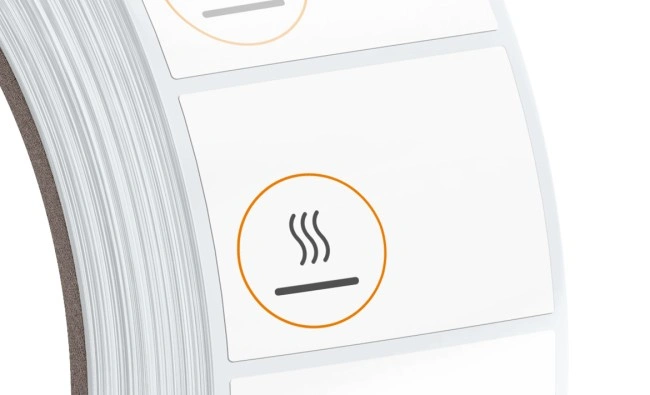- Products
- Service & Help
 Our printing experts will be happy to help you with any questions you may have about your order. Simply use our customer support.SupportNewsletter
Our printing experts will be happy to help you with any questions you may have about your order. Simply use our customer support.SupportNewsletter - About us
 Our printing experts will be happy to help you with any questions you may have about your order. Simply use our customer support.SupportNewsletter
Our printing experts will be happy to help you with any questions you may have about your order. Simply use our customer support.SupportNewsletter - Contact us
- Key Clients

Thermal labels
The advantages for you
- Can be printed using Direct Thermal printing
- Suitable for numerous applications
- Trouble-free processing
Can be calculated immediately in formats 100% of your choosing.
With thermal labels or thermal direct printing labels, a print image is produced by the selectively applying heat. This printed image can be recognized by the grey-black colouration of the corresponding areas.

Product Advisor for Labels
Whether it’s a simple roll label or a multi-layered specialty label – I’m your go-to person for questions concerning materials, adhesion, and finishing of labels for the pharmaceutical, cosmetic, food, chemical, and almost any other industry.
"Paper or film? We've got the perfect label!"
I will be happy to help you personally.
Types of thermal labels:
- scale labels
- foodstuff labels
- shipping labels
- sales slips
- transport tickets
- price labels
- entrance tickets
The simple and cost-effective type of label for printing variable data. Thermal labels are available as roll labels in many sizes. Thermal labels do fade over time, especially when exposed to sunlight or near heat sources.
The potential applications for the papers and films are described in detail in the calculator. Should you have any questions, please do not hesitate to contact our customer support team.
For a longer print life, we recommend our thermal transfer labels.
Direct thermal printing: how they work and the printing process
Thermal or temperature-dependent printing always requires a hot print head with the dots - special semiconductor resistors - and a specially coated, heat-sensitive material.
In direct thermal printing, a hot print head heats a thermo-sensitive material. The colour of the thermal paper changes where it is heated, thus making numbers, letters and/or a grid visible in black, whereby the print quality is not so important. This simple technology is inexpensive and is often used in supermarkets. Typical direct thermal printers are available in a compact format. Over time, with exposure to light and heat, the printed information fades. Those who need to keep receipts for tax purposes should make copies on normal paper (or scan them in).
Direct thermal printing has the advantage that it does not need consumables such as ink ribbons. The printer sends an electrical current to the elements in the thermal head which generate heat. In addition, devices for use with paper rolls, apart from refilling the paper roll, do not require any maintenance or additional consumables such as ink ribbons. The first direct thermal printers were used for low-cost fax machines. Today's applications include the printing of receipts, shipping labels, parking tickets, admission tickets, transport tickets, as well as scientific and medical examination protocols and barcode labels.
Resistance to environmental influences has significantly improved in today's thermal papers. This is achieved partly by applying a protective layer (topcoat), but also through improved formulations.





